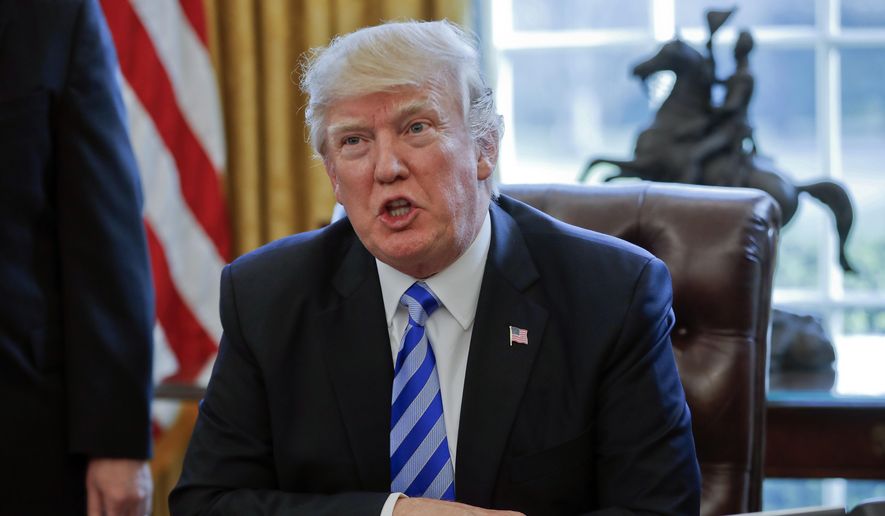President Trump is laying the groundwork this week to withdraw from the Paris climate agreement, seeking options for how to extricate the U.S. in a process that could take years to complete.
Details of the withdrawal are still in the works, but the effort is being led by Environmental Protection Agency Administrator Scott Pruitt, according to Axios, which first reported Wednesday on the direction the administration is leaning.
Sources told The Washington Times that Mr. Trump has made a final decision, but the White House is still exploring options for how to extricate the U.S. from the agreement signed by former President Barack Obama last year, and intended to be a capstone to his foreign affairs legacy.
Instead, it’s poised to become another Obama executive action unwound by his successor.
On Wednesday evening Mr. Trump took to Twitter to announce the exact decision time.
“I will be announcing my decision on Paris Accord, Thursday at 3:00 P.M. The White House Rose Garden,” he wrote, before repeating his campaign slogan in all capital letters “Make America Great Again!”
VOTE NOW: Good move for Trump to pull out of Paris climate deal?
Democrats and environmental groups blasted the president for even considering withdrawing from the accord, which would encourage severe limits on the amount of greenhouse gas emissions from the U.S. over the next eight years as part of a broad international framework.
House Minority Leader Nancy Pelosi called withdrawal a “stunning abdication of American leadership.”
“In walking away from this agreement, the president is denying scientific truths, removing safeguards that protect our health and our environment, protecting polluters and their dirty energy agenda and threatening our national and global security,” she said.
Environmental groups were even more heated, with the League of Conservation Voters calling it “a new low” and a “wildly irresponsible decision,” saying it “prioritized polluter profits over kids’ health.”
Yet at the same time they blasted Mr. Trump, environmentalists said Mr. Obama has already locked the U.S. on the path toward lower emissions, and said pressure either from the markets or from public relations will force American companies to stay on track.
“With or without U.S. leadership, other countries, businesses, states, cities and citizens are continuing the unstoppable march toward the clean energy economy,” said Gene Karpinski, president of the LCV.
In the agreement, Mr. Obama pledged the U.S. to reduce its greenhouse gas emissions in 2025 by 26 percent to 28 percent below the level they were at in 2005.
Mr. Trump, on the campaign trail last year, vowed to cancel the agreement — yet once in office he pulled back, saying he wanted to hear from all sides and rethink his decision.
State Department officials — many of them holdovers from the Obama era — fought to stay in the agreement, and were aided by new Secretary of State Rex W. Tillerson and Mr. Trump’s own family, including daughter Ivanka Trump and son-in-law Jared Kushner.
Leading the withdrawal charge are Mr. Pruitt and top Trump adviser Stephen K. Bannon. The White House’s top lawyer, Donald McGahn, also ended up tilting against the agreement, according to sources tracking the debate.
Mr. Trump spent much of last week meeting with European leaders, who pressured him to remain in the deal. Pope Francis also added his voice to the pressure, even giving the president a copy of the papal encyclical urging the world to battle climate change.
The deal’s defenders in the U.S. were searching desperately for an option short of withdrawal, fearful that an American opt-out would derail the global accord. They said withdrawal will harm U.S. leadership on the issue, and wondered whether Mr. Trump could instead negotiate an easier emissions target that would allow the country to remain part of the accord.
But the Obama State Department had ruled that option out, saying the targets in the deal were a minimum and could only be negotiated upward.
Mr. Obama had declined to submit the agreement to the Senate for ratification as a treaty, arguing it was a presidential accord that didn’t require approval. It would have likely been rejected had he submitted it, which would have been an embarrassing defeat.
The former president also failed to win passage in Congress of a greenhouse gas control scheme, forcing him to try to constrain the U.S. economy through executive branch regulations instead. Mr. Trump has already begun to unravel those regulations, making it unclear how the U.S. would achieve its Paris targets even if it did remain in the accord.
Sen. Mike Lee, who advocated for a full withdrawal from the climate agreement, said that binding the U.S. to an international agreement was a bad idea because other countries will not uphold their end of the agreement.
“When the United States commits to something, it abides by the rule of law. When other countries do the same, it doesn’t necessarily have the same effect,” the Utah Republican said on MSNBC.
“When we tie ourselves to an agreement internationally, we know that other [parties] might not abide by their limits. When we ourselves tie them to it, we know that we will to ours. I’d hate to see us harm our own economy by agreeing to something that other people, who we agree with, aren’t going to follow.”
Sen. Richard Blumenthal disagreed and said pulling out will undermine America’s credibility, and predicted the U.S. would fall behind in job creation in solar and other environmental technology.
“I think that our credibility will be undermined,” the Connecticut Democrat said on CNN. “If other countries lose confidence in our commitment to climate change, they may cut back their commitment. They’re going to fill the gap. China now is producing jobs and economic progress based on solar and wind investments. Other countries will in effect create more jobs and similarly surpass us.”
⦁ S.A. Miller and Sally Persons contributed to this article.
• Stephen Dinan can be reached at sdinan@washingtontimes.com.




Please read our comment policy before commenting.